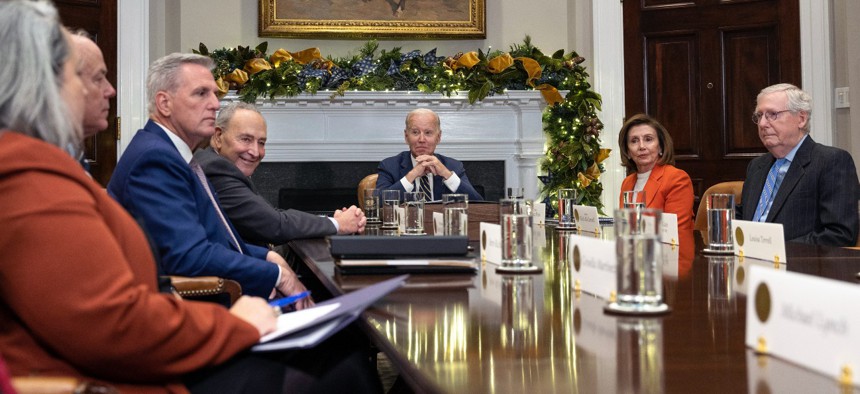
President Biden meets with congressional leaders on Tuesday to discuss legislative priorities through the end of the year. Kevin Dietsch/Getty Images
Democrats Are Writing Their Own Omnibus Funding Bill to Avoid a Shutdown
Lawmakers are also floating moving the shutdown deadline to Dec. 23 as a spending agreement remains elusive.
With negotiators making little progress and a deadline looming, Democrats in Congress are moving forward to write their own omnibus funding bill ahead of a potential shutdown next month.
The majority party is currently working on the fiscal 2023 spending package without Republican support, though an aide said lawmakers are including Republican priorities in the measure in hopes of eventually winning bipartisan support. Current funding is set to expire Dec. 16, and aides said that Democratic leadership is considering a one-week stopgap extension to buy more time for an agreement on full-year funding. The Dec. 23 deadline would bring Congress up against the holidays, providing an extra incentive for lawmakers to wrap up their work for the year.
A Senate aide said the bills Democrats are writing will include enough bipartisan priorities to pass both chambers and be signed into law. Without explicit Republican backing and input, however, that plan would likely face significant resistance. While Democrats previously put forward their own, partisan bills in both the House and Senate, top negotiators have yet to agree on the top-line funding levels that would open the door to truly bipartisan measures. Democrats will need at least 10 Republicans to pass any spending measure in the Senate.
On Monday, Senate Majority Leader Chuck Schumer, D-N.Y., said the Senate would turn to government funding after it passes the Respect for Marriage Act. He stressed that he will seek a full-year omnibus rather than a longer-term continuing resolution.
“Failing to act by [Dec. 16] would result in a pointless and painful shutdown right as the holiday season kicks into high gear,” Schumer said on the Senate floor. “The best option for avoiding a government shutdown, of course, is for Republicans to work with us on an omnibus, ensuring the federal government is fully prepared to serve the public in the next fiscal year.”
A source familiar with the negotiations said there is still hope for meeting the Dec. 16 deadline, but a one-week CR is possible if more time is needed to pass an omnibus.
“We aren’t there yet,” the source said, adding that “no one wants a full-year CR, but it’s not out of the question.”
A Republican aide said the majority has yet to inform them of any plans for a one-week stopgap.
Defense Department Secretary Lloyd Austin sent a letter on Monday to congressional leaders strongly cautioning against the year-long CR, which would lock in current spending levels for the rest of the fiscal year and deny opportunities for funding new programs. Such an outcome would hurt recruiting and hiring, research and development, investments in infrastructure and competitiveness with adversaries like China, he said. The secretary added that the nation's security also depended on investments in the departments of State, Homeland Security, Energy, Justice, Health and Human Services, Veterans Affairs and others.
“It is essential that Congress act now to complete a full-year, whole of government funding bill before the end of 2022,” Austin said in the letter, which was first reported by Politico. “Failure to do so will result in significant harm to our people and our programs and would cause harm to our national security and our competitiveness.”
Some Republicans have pushed their leaders to avoid any full-year funding measures, instead suggesting Congress should pass a stopgap into next year when Republicans will take control of the House and gain more leverage in negotiations. The top appropriators in the Senate, Sens. Patrick Leahy, D-Vt., and Richard Shelby, R-Ala., are both retiring at the end of the year and have said they do not want to leave Congress without the funding issues resolved for the remainder of fiscal 2023.
“Right now, Chairman Leahy is focused on completing the omnibus,” said Jay Tilton, a Leahy spokesman.
On Tuesday, Schumer, Senate Minority Leader Mitch McConnell, R-Ky., House Speaker Nancy Pelosi, D-Calif., and House Minority Leader Kevin McCarthy, R-Calif., went to the White House to meet with President Biden and his legislative team to discuss government funding and other priorities for the remainder of the year. The White House has asked Congress to provide extra funding for its ongoing fight against COVID-19, Ukraine aid and disaster relief.
“We’re going to work together—I hope to work together—to fund the government, COVID and the war in Ukraine,” Biden said ahead of the meeting.
After the meeting, Schumer said he and McConnell agreed to work together on a full-year omnibus.
"We hope it can be done this year, and we know each side is going to have to give in order to send an omnibus to the president's desk," Schumer said.
McConnell later added there was "widespread agreement" to push for an omnibus over a CR, but cautioned there were still "significant hurdles" to get over.
This story has been updated with McConnell's comments.







